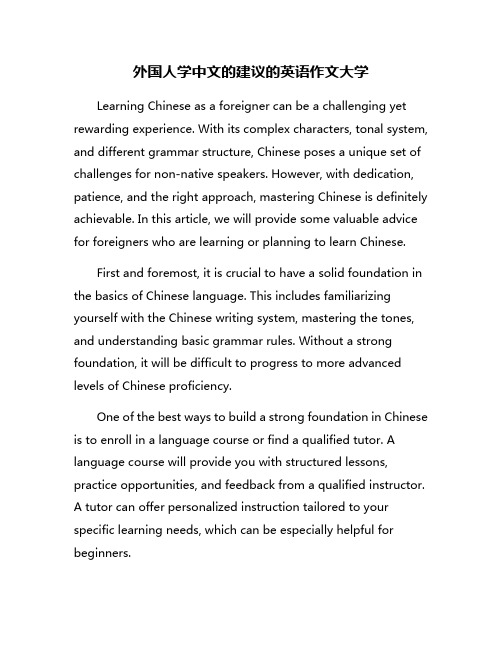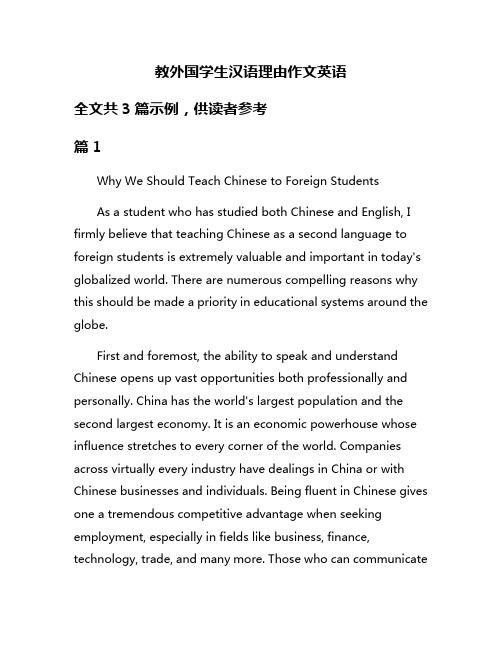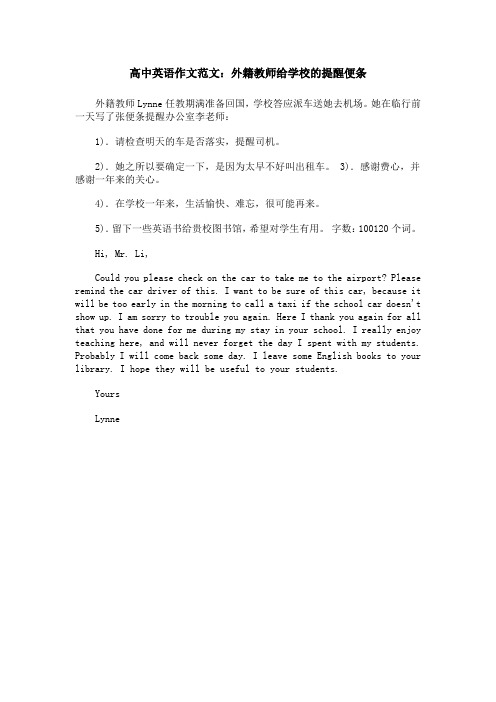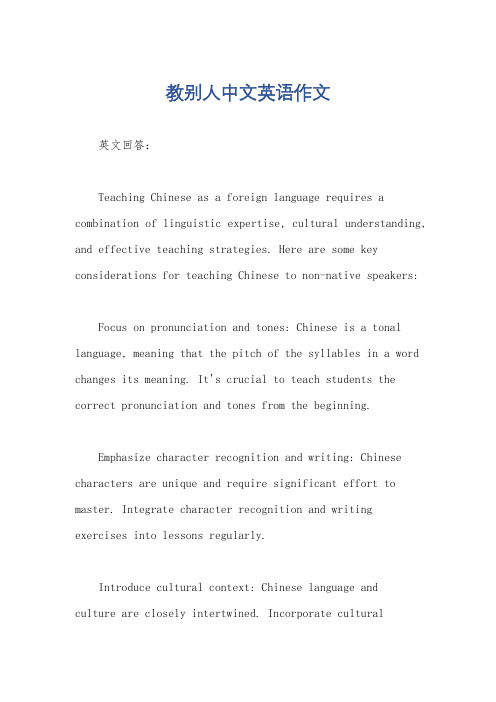我教中国人英文【外籍教师的忠告】中英文
外国朋友想在中国教英语提建议作文

外国朋友想在中国教英语提建议作文Teaching English in China can be a rewarding and challenging experience for foreign teachers. There are several important factors to consider in order to be successful in this endeavor. From understanding the cultural differences to adapting teaching methods, foreign teachers must be willing to be flexible and open-minded. By keeping these key suggestions in mind, foreign friends can have a positive and enriching experience teaching English in China.One of the most crucial elements for a foreign teacher in China is to develop a deep understanding and appreciation for the local culture. China has a rich history and unique traditions that greatly influence the mindset and behaviors of students. Foreign teachers who take the time to learn about Chinese culture, customs, and values will be better equipped to connect with their students and create an effective learning environment. This could involve studying the Chinese language, observing local traditions, or simply being an active listener and learner in the classroom.Additionally, foreign teachers must be adaptable and willing toadjust their teaching styles to suit the needs of Chinese students. Pedagogical approaches that may be successful in Western countries do not always translate seamlessly to the Chinese context. For instance, Chinese students tend to be more reserved and less inclined to participate actively in class discussions compared to their Western counterparts. Foreign teachers should be prepared to employ more interactive and engaging teaching methods to encourage student participation, such as incorporating group activities, multimedia resources, and real-world scenarios into their lessons.Moreover, foreign teachers should be mindful of the differences in educational systems and learning preferences between China and their home countries. In China, the emphasis is often placed on rote learning, examination-oriented instruction, and respect for authority figures. Foreign teachers may need to adapt their lesson planning and classroom management strategies to align with these cultural norms, while still incorporating elements of critical thinking and independent learning.Another important consideration for foreign teachers in China is the language barrier. While English is widely taught and used in China, many students, especially in smaller cities or rural areas, may have limited proficiency in the language. Foreign teachers should be prepared to utilize various techniques to facilitate effectivecommunication, such as using simple vocabulary, providing visual aids, and encouraging students to ask questions. Additionally, learning some basic Mandarin Chinese can greatly enhance a foreign teacher's ability to connect with students and navigate daily life in China.Furthermore, foreign teachers should be aware of the unique challenges faced by Chinese students in learning English. Many Chinese students struggle with pronunciation, grammar, and idiomatic expressions due to the significant differences between the Chinese and English languages. Foreign teachers can help address these challenges by incorporating targeted exercises, providing constructive feedback, and encouraging students to practice regularly outside the classroom.Additionally, foreign teachers should be mindful of the societal and educational pressures that Chinese students often face. Many students are under immense pressure to perform well academically, which can lead to high levels of stress and anxiety. Foreign teachers can help alleviate this by creating a supportive and nurturing learning environment, offering emotional support, and encouraging a balanced approach to education.Another crucial aspect for foreign teachers in China is to establish strong relationships with their students. Chinese culture places ahigh value on personal connections and respect for authority figures. By demonstrating genuine care and interest in their students' well-being, foreign teachers can build trust, foster a positive learning atmosphere, and ultimately enhance the effectiveness of their instruction.Moreover, foreign teachers should be prepared to adapt their teaching methods and materials to align with the specific needs and learning styles of their students. This may involve incorporating elements of Chinese culture and history into lesson plans, using familiar references and examples, or tailoring assessments to match the students' language proficiency levels.Additionally, foreign teachers should be aware of the administrative and logistical challenges that may arise in the Chinese educational system. This could include navigating bureaucratic procedures, understanding school policies, and collaborating effectively with local teachers and administrators. By being proactive and seeking guidance when needed, foreign teachers can navigate these challenges and ensure a smooth and successful teaching experience.Finally, foreign teachers should be open to continuous learning and professional development. Teaching in China presents unique opportunities for personal and professional growth. By embracing a mindset of lifelong learning, foreign teachers can enhance theirteaching skills, deepen their understanding of Chinese culture, and contribute to the ongoing development of English education in the country.In conclusion, teaching English in China can be a rewarding and transformative experience for foreign teachers. By understanding the cultural differences, adapting teaching methods, addressing language barriers, building strong relationships with students, and continuously learning and growing, foreign teachers can make a meaningful impact on the lives of their students and contribute to the advancement of English education in China.。
建议外国朋友学中文英语作文初中

建议外国朋友学中文英语作文初中Title: Advice for Foreign Friends Learning ChineseNowadays, with the increasing globalization and cultural exchange between countries, learning a foreign language has become more important than ever. For foreign friends who are interested in learning Chinese, here are some tips and advice to help you improve your Chinese language skills.Firstly, it is important to establish a solid foundation in Chinese grammar and vocabulary. Chinese grammar is quite different from English grammar, so it is crucial to spend time studying the basic rules and structures of the language. Make use of textbooks, online resources, and language learning apps to practice and reinforce your knowledge.Secondly, practice speaking Chinese as much as possible. Language is a skill that needs regular practice to improve, so try to engage in conversations with native Chinese speakers whenever you can. This will help you improve your pronunciation, fluency, and confidence in speaking Chinese.Thirdly, immerse yourself in the Chinese language and culture. Watch Chinese movies and TV shows, listen to Chinese music, and read Chinese books and newspapers. This will helpyou familiarize yourself with the language and gain a deeper understanding of Chinese culture and society.Additionally, consider taking Chinese language classes or hiring a tutor to provide personalized guidance and feedback on your language skills. Working with a professional can help you progress more quickly and efficiently in your language learning journey.Lastly, be patient and persistent in your efforts to learn Chinese. Language learning is a gradual process that requires time and dedication, so don't get discouraged if you encounter difficulties along the way. Keep practicing, seeking help when needed, and staying motivated to achieve your language learning goals.In conclusion, learning Chinese can be a rewarding and enriching experience for foreign friends. By following these tips and advice, you can improve your Chinese language skills and deepen your understanding of Chinese culture. Remember to stay committed, practice regularly, and enjoy the journey of learning a new language. Good luck!。
外国人学中文的建议的英语作文大学

外国人学中文的建议的英语作文大学Learning Chinese as a foreigner can be a challenging yet rewarding experience. With its complex characters, tonal system, and different grammar structure, Chinese poses a unique set of challenges for non-native speakers. However, with dedication, patience, and the right approach, mastering Chinese is definitely achievable. In this article, we will provide some valuable advice for foreigners who are learning or planning to learn Chinese.First and foremost, it is crucial to have a solid foundation in the basics of Chinese language. This includes familiarizing yourself with the Chinese writing system, mastering the tones, and understanding basic grammar rules. Without a strong foundation, it will be difficult to progress to more advanced levels of Chinese proficiency.One of the best ways to build a strong foundation in Chinese is to enroll in a language course or find a qualified tutor. A language course will provide you with structured lessons, practice opportunities, and feedback from a qualified instructor.A tutor can offer personalized instruction tailored to your specific learning needs, which can be especially helpful for beginners.In addition to formal instruction, it is important to practice Chinese regularly in real-life situations. This could involve speaking with native Chinese speakers, watching Chinese TV shows or movies, or listening to Chinese music. Immersing yourself in the language will help you improve your listening and speaking skills, as well as your overall comprehension of Chinese.Another key aspect of learning Chinese is to focus on vocabulary acquisition. Chinese characters can be intimidating at first, but by learning a few characters each day and practicing writing and reading them regularly, you will gradually build your vocabulary. Flashcards, online resources, and language learning apps can be useful tools for expanding your vocabulary.Furthermore, it is essential to practice your pronunciation and tones consistently. Chinese is a tonal language, meaning that the meaning of a word can change depending on the tone used. It is important to pay attention to tones from the beginning and practice them regularly to avoid misunderstandings when speaking Chinese.Additionally, immersing yourself in Chinese culture can greatly enhance your language learning experience. Learning about Chinese history, traditions, and customs will not only deepen your understanding of the language but also providevaluable context for your studies. Visiting China or participating in cultural events in your local community can also provide opportunities for language practice and cultural exchange.Lastly, it is important to stay motivated and persistent in your language learning journey. Learning Chinese can be a challenging and time-consuming process, but with dedication and perseverance, you will see progress over time. Set achievable goals for yourself, celebrate your accomplishments, and don't be discouraged by setbacks.In conclusion, learning Chinese as a foreigner requires hard work, dedication, and a positive attitude. By following these tips and staying committed to your studies, you can achieve fluency in Chinese and open up exciting new opportunities for personal and professional growth. Remember, practice makes perfect, so keep studying, speaking, and immersing yourself in the language to reach your language learning goals. Good luck!。
我们的外籍教师(OurForeignTeacher)_初中英语作文

我们的外籍教师(Our Foreign Teacher)ms jerry is a foreign teacher. she oomes from new zealand. she is thirty-one years old. she has fair hair, white skin and gray eyes. she is tall and slim. she looks very kind. and in fact, she is kind indeed.ms jerry is a good teacher. although she only comes to our school twice a week, yet she is very responsible to her work and strict with her students. once. she was ill, but she went on giving us lessons. when we learned this, we all listened to her even more attentively than usual.ms jerry teaches us english with great enthusiasm:" eaoh lesson she will bring us new pictures, new stories, new games and new songs. her class is always full of happy laughter and merry songs.ms jerry is such a good teacher that all of us love and respect her.“我的外籍老师”英语译文:jerry老师是个外籍教师,来自新西兰,今年三十一岁。
教外国学生汉语理由作文英语

教外国学生汉语理由作文英语全文共3篇示例,供读者参考篇1Why We Should Teach Chinese to Foreign StudentsAs a student who has studied both Chinese and English, I firmly believe that teaching Chinese as a second language to foreign students is extremely valuable and important in today's globalized world. There are numerous compelling reasons why this should be made a priority in educational systems around the globe.First and foremost, the ability to speak and understand Chinese opens up vast opportunities both professionally and personally. China has the world's largest population and the second largest economy. It is an economic powerhouse whose influence stretches to every corner of the world. Companies across virtually every industry have dealings in China or with Chinese businesses and individuals. Being fluent in Chinese gives one a tremendous competitive advantage when seeking employment, especially in fields like business, finance, technology, trade, and many more. Those who can communicateeffectively in Chinese are extremely valuable assets to any organization operating internationally.Beyond the professional benefits, learning Chinese grants access to one of the world's most ancient and rich cultures and civilizations. China has a continuous history stretching back thousands of years filled with incredible achievements in philosophy, literature, art, architecture, cuisine, and more. Understanding the language allows one to fully appreciate these cultural treasures in their original contexts rather than through the lens of translation. Things are often lost when converted from one language to another. Speaking Chinese opens the door to truly experiencing Chinese culture from the inside. As the world becomes increasingly connected, fostering cross-cultural understanding is critically important. What better way than learning the language of over a billion people?Additionally, the linguistic benefits of studying a language as distinct from English as Chinese are extremely valuable from an educational standpoint. The Chinese writing system is logographic rather than alphabetic, and the grammar and constructions are completely different from European languages. Learning Chinese gives the brain quite a workout and enhances overall cognitive abilities. Studies have shown that bilingualismcan improve focus, memory, problem-solving, and critical thinking skills. The mental gymnastics required to switch between vastly differing language systems like Chinese and English helps keep the brain flexible, active and healthy.From a pragmatic perspective, Chinese is already one of the most widely spoken languages globally, with more total native speakers than any other language. But its importance is growing rapidly. Hundreds of millions around the world are currently studying Chinese as a second language. In the coming decades, being able to communicate in Chinese will be absolutely essential for operating on the world stage, regardless of one's field. Those who can't speak the language will be at a severe disadvantage compared to their Chinese-speaking peers. Getting ahead of the curve and making Chinese instruction available at an early age positions students for future success.There's also a strong social argument for studying Chinese. In our hyper-connected era, the ability to communicate directly with over a billion people in their native tongue helps break down boundaries and fosters cross-cultural connections in a way that translation can't duplicate. It combats xenophobia, builds mutual understanding between vastly different societies, and unites the human family across linguistic lines in a very real sense.The more widely Chinese is studied, the more connected and integrated we all become as a global community.Of course, like the study of any language, there are challenges that come with learning Chinese as a foreign student. The writing system, with its vast numbers of complex logograms, is extremely difficult even for native speakers to fully master. The tones and sounds can also be very tricky for those whose native languages don't utilize tones. And the divergence from English grammar and constructions is often baffling early on. These hurdles require patience, discipline and an open mindset.However, the benefits greatly outweigh these difficulties. While Chinese is by no means an easy language for foreigners to learn, it is certainly possible with quality instruction and diligent effort. And the personal growth and culturally eye-opening experiences that accompany Chinese studies make the tough patches all worthwhile in the end.In an increasingly interconnected and globalized society, multilingualism in general needs to be strongly promoted and prioritized in educational curricula around the world. And Mandarin Chinese, with its immense economic importance and cultural richness, should be among the languages offered from an early age. The earlier Chinese instruction begins, the morefluent and comfortable with the language students will become over time.Ultimately, giving foreign students the opportunity to learn Chinese provides them with tools for enhanced cognitive development, opens doors to career opportunities working with the world's most populous country and its diaspora communities, grants privileged access to an endlessly fascinating ancestral civilization, nurtures cross-cultural relationships, and equips them to thrive in our modern age of globalization. For all these reasons, promoting Chinese as a second language needs to be a core goal for educators and policymakers worldwide. With commitment and vision, we can raise a generation of youth who are truly citizens of the world.篇2Why We Should Teach Chinese to Foreign StudentsAs a student who has studied both English and Chinese, I believe there are compelling reasons why we should make learning Chinese a priority for foreign students around the world. China's rising economic and cultural influence means that Chinese language skills will become increasingly valuable assets in the years ahead.To start with the most obvious rationale, China has the world's largest population at 1.4 billion people. As its economy continues rapid growth and development, opportunities will abound for those who can communicate and negotiate in Chinese. Multinational corporations are increasingly doing business in China, and having employees conversant in Mandarin gives them a major competitive edge. Job prospects will be brighter for those who have taken the time to learn this immensely useful language.Beyond the economic incentives, promoting Chinese study fosters cross-cultural understanding in our globalized world. Language is inextricably intertwined with culture. By learning to speak, read, and write Chinese, students gain insights into China's rich history, customs, values, and ways of thinking. This expanded worldview makes them more empathetic and effective communicators across cultural barriers.From a personal growth perspective, the Chinese language is an intellectual achievement that trains the mind through its complexity. With tonal variations and thousands of unique characters, Mandarin stretches cognitive abilities in helpful ways. The sense of accomplishment that comes with mastering such an intricate language builds confidence. Learning any new languagemakes our brains work harder to recognize patterns, visualize concepts, and make connections.On a philosophical level, I believe having more English speakers learn Chinese could help offset tensions between China and the West. Misunderstandings and conflicts often stem from an inability to see another's point of view. By encouraging the open exchange of ideas through a shared language, people can start to appreciate different perspectives. More dialogue means fewer dangerous assumptions made out of ignorance.Cross-cultural friendships pave the way for more trust and cooperation between nations.Some may argue that English is already the global lingua franca of business and diplomacy, so what's the point of investing time into an extremely difficult language like Chinese? While English does predominate presently, I would counter that the future landscape is rapidly shifting. China's clout on the world stage is only growing stronger. Within a few decades, being bilingual in English and Chinese may become the new norm for elite students and professionals worldwide. Getting an early start puts learners at a major advantage.Others might claim that resources would be better spent reinforcing foundational skills in English, math, and sciencerather than diverting efforts elsewhere. While those core subjects are undoubtedly crucial, I believe a well-rounded education should make room for Chinese as well. In our multimedia age, students are incredibly adept at juggling multiple interests simultaneously. Learning another language, especially one as distinct from English as Chinese, ends up supporting overall cognitive development.From my own experience, English was my first language growing up, but I was lucky enough to attend a Chinese immersion elementary school. Those early language lessons instilled an enduring appreciation for Chinese culture along with the ability to communicate directly with over a billion people. While Chinese grammar and writing took sublime effort to master, the feeling of breaking through barrier after mental barrier was immensely rewarding. I'm deeply grateful to have had that opportunity from a young age.When I see non-Chinese speaking friends struggle with simple exchanges like ordering food or asking directions while in China, I'm reminded of how much richer the experience becomes when you можфcan converse natively. Mundane tasks become windows into a new culture rather than mere transactions. Having been let behind the linguistic curtain has made China feellike a second home despite my outward appearance. The insights I've gained have made me a more flexible andopen-minded person.At the university level, Chinese courses are rightly becoming more popular and oversubscribed each year as students recognize the tremendous value proposition. However, I believe the biggest impact will come from prioritizing Chinese from the elementary school level onward. Young minds prove incredibly adept at acquiring new languages through sustained immersion. Starting Chinese studies at an early age gives students the best chance to achieve true mastery and fluency. It also helps normalize the idea of being bilingual and bicultural from a young age.Those who can navigate effortlessly between Chinese and English will have a huge leg up in our interconnected world. They will qualify for unique job opportunities, accelerate their cognitive development, and serve as bridging allies between East and West. Speaking Chinese opens doors, both literal and metaphorical. While learning the language requires substantial dedication, the personal and professional rewards make it worthwhile many times over.I truly believe that more schools should follow the lead of forward-thinking institutions that promote Chinese immersion programs. It sets students up for success in our increasingly Sino-centric world. In an era where China looms so large on the global stage, fluency in its principal language should be considered an invaluable 21st century skill. The sooner we make this a priority in our educational systems, the better prepared our students will be to thrive in this millennium.篇3Why Every Foreign Student Should Learn Mandarin ChineseAs an international student studying abroad, I can't emphasize enough how incredibly valuable it has been to learn Mandarin Chinese. Sure, it's a challenging language with tones, characters, and a completely different writing system than English. But the rewards of learning this ancient yet modern language have been immense and life-changing. Here are the top reasons why I think every foreign student should make an effort to learn Mandarin.Mandarin Opens Doors Across the GlobeWith over 1 billion native speakers, Mandarin is the most widely spoken language in the world. It's one of the six officiallanguages of the United Nations. By learning this global lingua franca, you'll be able to communicate with people from China, Taiwan, Singapore, and Chinese communities everywhere. Whether you want to work at a multinational corporation, start a business, or just make new friends, Mandarin will connect you with over 16% of the world's population. Talk about breaking down barriers!It Provides a Competitive Edge in the Job MarketIn our globalized world, employers are actively seeking candidates who can operate across cultures. Mandarin skills make you stand out tremendously, especially when so fewnon-Chinese really master the language. Being bilingual in English and Mandarin will give you a true competitive advantage in fields like business, finance, technology, media, tourism...pretty much any industry with an international presence. With China's economic might continuing to rise, Mandarin proficiency will only become more valuable over time. What employer wouldn't want to hire someone who can navigate the world's second largest economy?You'll Gain Insight into One of the World's Oldest CulturesChina has a vast, rich cultural heritage stretching back thousands of years. By learning Mandarin, you'll gain a deeperappreciation for Chinese arts, philosophy, history, customs, and way of life. You'll be able to read ancient texts like the Analects of Confucius in their original language. You'll understand the cultural context behind traditions like the Spring Festival, Dragon Boat races, and the Mid-Autumn Moon Festival. Connecting with such an impactful culture through its language is tremendously rewarding and eye-opening.It Keeps Your Brain SharpNumerous studies have shown that bilingualism can have significant cognitive benefits. The continual exercise of switching between two languages engages the brain in a way that enhances focus, problem-solving, multitasking, and even protection against dementia later in life. By taking on the challenge of learning Mandarin's complex writing system, tones, and grammar structure, you'll be giving your brain an incredible mental workout. You'll be a smarter, more mentally agile version of yourself.Mandarin Opens Up Opportunities to Live and Work AbroadFluency in Mandarin allows you to immerse yourself in Chinese language environments in so many amazing ways. You can study abroad at prestigious universities in Beijing, Shanghai, or Taiwan. You can land internships or jobs at majormultinationals with operations in China. You can even join the ranks of adventurous expats living and working in booming cities across the mainland. China has emerged as an economic superpower, and opportunities to live and work there are expanding rapidly. With Mandarin under your belt, you'll have a huge advantage in taking advantage of these opportunities.It Connects You to a Global CommunityOne of the most rewarding aspects of learning Mandarin has been my ability to connect with Chinese and Mandarin-speaking people all over the world. Not just while traveling through China, but in my everyday life, suddenly the local Chinese neighborhoods in my city became accessible. I made new friends in the large Chinese student community on campus. I attended meetings with Chinese cultural organizations. I delved into Chinese music, cinema, and social media. By bridging that language divide, my worldview expanded tremendously as I engaged with this dynamic, global community.At the end of the day, Mandarin Chinese is simply too important and too powerful of a language to ignore. It links you to 1.4 billion people in the world's most populous country and an economic behemoth that will only grow more influential in the coming decades. For an international student like myself,being bilingual and bicultural has been an incredible asset in expanding my horizons, opportunities, and human connections across the world. If you have any interest in business, working abroad, technology, academics, or just broadening your worldview, do yourself a favor and start learning Mandarin today. It may be challenging, but it will be one of the most rewarding decisions you ever make.。
劝导外国人继续学习汉语的作文

劝导外国人继续学习汉语的作文英文回答,Learning Chinese is a valuable and rewarding experience. It opens up a whole new world of opportunities for communication, business, and cultural understanding. As a language spoken by over a billion people worldwide, mastering Chinese can greatly enhance your personal and professional life.中文回答,学习汉语是一种有价值且有益的经历。
它为沟通、商务和文化理解开辟了全新的机会。
作为全球超过十亿人口使用的语言,掌握汉语可以极大地提升个人和职业生活。
英文回答,If you continue to study Chinese, you will be able to communicate with a large portion of the world's population and gain a deeper understanding of Chinese culture and traditions. This will not only enrich your own life but also make you more marketable in the global job market.中文回答,如果你继续学习汉语,你将能够与全球大部分人口进行交流,并更深入地了解中国文化和传统。
这不仅会丰富你自己的生活,还会使你在全球就业市场上更具竞争力。
英文回答,Furthermore, China is a major player in the global economy, and being able to speak Chinese will give you a significant advantage in the business world. Many international companies are looking for employees who can speak Chinese, and by learning the language, you will increase your chances of landing a great job with a multinational corporation.中文回答,此外,中国是全球经济的重要参与者,能够讲汉语将使你在商业领域拥有重大优势。
高中英语作文范文:外籍教师给学校的提醒便条

高中英语作文范文:外籍教师给学校的提醒便条外籍教师Lynne任教期满准备回国,学校答应派车送她去机场。
她在临行前一天写了张便条提醒办公室李老师:1).请检查明天的车是否落实,提醒司机。
2).她之所以要确定一下,是因为太早不好叫出租车。
3).感谢费心,并感谢一年来的关心。
4).在学校一年来,生活愉快、难忘,很可能再来。
5).留下一些英语书给贵校图书馆,希望对学生有用。
字数:100120个词。
Hi, Mr. Li,Could you please check on the car to take me to the airport? Please remind the car driver of this. I want to be sure of this car, because it will be too early in the morning to call a taxi if the school car doesn't show up. I am sorry to trouble you again. Here I thank you again for all that you have done for me during my stay in your school. I really enjoy teaching here, and will never forget the day I spent with my students. Probably I will come back some day. I leave some English books to your library. I hope they will be useful to your students.YoursLynne。
教别人中文英语作文

教别人中文英语作文英文回答:Teaching Chinese as a foreign language requires a combination of linguistic expertise, cultural understanding, and effective teaching strategies. Here are some key considerations for teaching Chinese to non-native speakers:Focus on pronunciation and tones: Chinese is a tonal language, meaning that the pitch of the syllables in a word changes its meaning. It's crucial to teach students the correct pronunciation and tones from the beginning.Emphasize character recognition and writing: Chinese characters are unique and require significant effort to master. Integrate character recognition and writing exercises into lessons regularly.Introduce cultural context: Chinese language andculture are closely intertwined. Incorporate culturalinsights and examples into your teaching to help learners understand the language's nuances.Use a variety of teaching methods: Engage students through a variety of methods, such as interactive games,role-playing, and dialogues. Cater to different learning styles by incorporating visual, auditory, and kinesthetic activities.Provide ample practice opportunities: Provide regular opportunities for students to practice speaking, listening, reading, and writing Chinese. Encourage them to use the language outside of class as well.中文回答:如何教外国人中文。
外国人想学中文 给些意见的英语作文

外国人想学中文给些意见的英语作文Learning Chinese is a challenging but rewarding task for many foreigners who are interested in the language and culture of China. Chinese, with its intricate characters and tonal nature, can seem like a daunting language to learn for those who are not familiar with it. However, with dedication and practice, it is definitely possible for foreign learners to master the language.If you are a foreigner who is interested in learning Chinese, here are some tips and advice to help you on your language learning journey:1. Start with the basicsJust like with any language, it is important to start with the basics when learning Chinese. Start by learning the basic greetings, numbers, and simple phrases. Practice pronunciation and tones carefully, as they are crucial in Chinese.2. Immerse yourself in the languageOne of the best ways to learn a language is to immerse yourself in it. Surround yourself with Chinese language and culture by watching Chinese TV shows, listening to Chinese music, and reading Chinese books. This will help you improve your listening and comprehension skills.3. Find a language partnerFinding a language partner who is a native Chinese speaker can be incredibly beneficial. You can practice speaking with them, ask questions, and get feedback on your pronunciation and grammar. Language exchange programs are a great way to find a language partner.4. Practice regularlyConsistency is key when learning a language. Make sure to practice Chinese regularly, even if it's just for a few minutes each day. Set specific language learning goals for yourself and track your progress.5. Use language learning apps and resourcesThere are many language learning apps and resources available online that can help you learn Chinese. Apps like Duolingo, HelloChinese, and Pleco are great for practicing vocabulary and grammar. Online resources like podcasts and YouTube channels can also be helpful.6. Be patient and persistentLearning a language takes time and effort, so be patient with yourself. Don't get discouraged if you make mistakes or findcertain aspects of the language challenging. Keep practicing and don't give up.7. Travel to ChinaIf possible, consider traveling to China to immerse yourself in the language and culture. Being surrounded by native speakers and using Chinese in real-life situations can greatly accelerate your language learning.8. Take Chinese language classesConsider taking Chinese language classes at a local language school or university. Having a structured learning environment and a qualified teacher can help you progress faster in your language learning journey.In conclusion, learning Chinese as a foreigner is definitely achievable with the right mindset and approach. By following these tips and advice, you can improve your Chinese language skills and gain a deeper understanding of Chinese culture. Good luck on your language learning journey!。
HiringForeignTeachers英语作文

HiringForeignTeachers英语作文Hiring Foreign Teachers 英语作文Hiring foreign teachers in Chineseuniversities is necessary在中国大学中雇佣外教是否有必要Nowadays, there are more and more foreigners come to China for teaching. The majority of Chinese show agreement about this phenomenon, though there are more or less Chinese stand on the opposite side. Maybe still some people don’t realize the advantage of having foreign teachers to instruct our English: they help us to improve our oralEnglish, know more about culture and make different friends.如今,有越来越多的外国人来中国教学。
大部分中国人对这一现象表示表示赞同,虽然有或多或少的人是站在对立面的。
也许还有些人没有意识到有外籍教师指导我们英语的好处:他们帮助我们提高英语口语,更加了解文化并交到不同的朋友。
First of all, it’s a common thing that Chinese students are good at writing English exam, but can’t talk in dailylife. If we have foreigners to be our English teachers, we have to use English to communicate with them. Otherwise, we can’t finish study task. Therefore, in one way, having foreign teachers help us open our mouth to speak, this is the best way to practice our oral English. In addition, talking face-to-face is the most effective way to correct speaking mistakes and recorrect them.首先,中国学生擅长写英语考试,却不能在日常生活中对话是常见的事。
教外国人jack如何高效学汉语的英语作文

教外国人jack如何高效学汉语的英语作文Title: Teaching Foreigner Jack How to Effectively Learn ChineseLearning a new language can be a challenging task, especially when it comes to learning Mandarin Chinese. As a language with a complex writing system and tonal pronunciation, mastering Chinese can be a daunting prospect for many foreign learners. However, with the right approach and techniques, it is possible to make rapid progress in learning Chinese. In this article, we will discuss some strategies to help foreigner Jack effectively learn Chinese.1. Immerse Yourself in the LanguageOne of the most effective ways to learn a new language is to immerse yourself in it as much as possible. Surround yourself with Chinese language materials such as books, movies, music, and TV shows. Try to listen to Chinese music or radio programs, watch Chinese TV shows or movies, and read Chinese books or articles. The more you expose yourself to the language, the faster you will pick up new vocabulary and improve your listening and speaking skills.2. Practice RegularlyConsistent practice is key to language learning success. Make a habit of practicing Chinese every day, even if it's just for 10-15 minutes. Set aside dedicated time for language practice and stick to it. Practice speaking with native speakers, writing characters, and listening to Chinese podcasts or audiobooks. The more you practice, the more confident and proficient you will become in using the language.3. Focus on Speaking and Listening SkillsWhen learning Mandarin Chinese, it's essential to focus on developing your speaking and listening skills. Chinese is a tonal language, so mastering pronunciation is crucial. Practice speaking Chinese with native speakers, and pay close attention to tones and intonation. Listen to Chinese speakers and try to mimic their pronunciation. The more you practice speaking and listening, the more natural and fluent you will become in Chinese.4. Use Language Learning Apps and ResourcesThere are many language learning apps and resources available that can help you improve your Chinese language skills. Apps like Duolingo, HelloChinese, and Chineasy provide interactive lessons and practice exercises to help you learn Chinese. Use flashcards, vocabulary apps, and language learningwebsites to supplement your learning. These resources can help you reinforce what you've learned and expand your vocabulary.5. Study Chinese CharactersLearning Chinese characters can be intimidating, but it's an essential aspect of mastering the language. Start by learning basic radicals and stroke order, and practice writing characters regularly. Use flashcards or mnemonic devices to help you remember characters. Focus on learning common characters and vocabulary words that are used in everyday conversations. The more characters you learn, the easier it will be to read and write in Chinese.6. Seek Language Exchange PartnersFinding a language exchange partner can be a valuable resource for practicing your Chinese skills. Look for native Chinese speakers who want to improve their English and exchange language practice sessions. Practice speaking in Chinese with your language partner, and ask for feedback on your pronunciation and grammar. Language exchange is a great way to improve your speaking skills and gain insight into Chinese culture.7. Be Patient and PersistentLearning a new language takes time and effort, so it's important to be patient and persistent. Don't get discouraged by slow progress or setbacks - keep practicing and learning, and you will see improvement over time. Celebrate small victories and milestones in your language learning journey, and stay motivated by setting achievable goals. With dedication and perseverance, you can become fluent in Chinese.In conclusion, learning Mandarin Chinese can be a rewarding and enriching experience. By following these strategies and tips, foreigner Jack can effectively learn Chinese and make rapid progress in mastering the language. With commitment, practice, and perseverance, anyone can become fluent in Mandarin Chinese. Embrace the challenge of learning a new language and enjoy the journey of becoming bilingual. Good luck!。
教外国人学习中文英语作文150词

教外国人学习中文英语作文150词Teaching Foreigners Chinese and EnglishIn today's globalized world, communication across cultures has become increasingly important. As such, learning foreign languages has become a valuable skill. Among the most widely spoken languages in the world are Chinese and English, making them popular choices for foreign language learners. Teaching foreigners Chinese and English presents unique challenges and opportunities.When teaching Chinese to foreigners, one must consider the complex writing system, pronunciation tones, and grammar rules. Chinese characters can be intimidating to beginners, but with proper guidance and practice, students can gradually build proficiency. Teaching English to foreigners also has its challenges, such as pronunciation differences, irregular verbs, and the nuances of idiomatic expressions.To effectively teach Chinese and English to foreigners, teachers must be patient, understanding, and culturally sensitive. It is important to create a supportive and inclusive learning environment that encourages students to practice speaking, reading, and writing in the target language. Utilizing a variety ofteaching methods, including multimedia resources, interactive exercises, and real-life scenarios, can help keep students engaged and motivated.Furthermore, providing opportunities for cultural exchange and language immersion can enhance the learning experience for foreigners. Immersing students in Chinese andEnglish-speaking environments can help them develop their language skills more quickly and effectively. Cultural activities, such as cooking classes, cultural outings, and language exchange programs, can also deepen students' understanding of the language and its cultural context.In conclusion, teaching foreigners Chinese and English is a rewarding experience that requires patience, creativity, and cultural sensitivity. By providing a supportive learning environment and incorporating engaging teaching methods, educators can help students develop their language skills and cultural understanding. Through language learning, we can bridge cultural divides and foster greater understanding and communication across borders.。
外国网友想学汉语给建议英语作文

外国网友想学汉语给建议英语作文Learning Chinese as a foreigner can be a challengingyet rewarding experience. There are several factors to consider when embarking on this journey, and it's important to approach it with an open mind and a willingness to immerse oneself in the language and culture. Here are some tips and advice for foreign netizens who are interested in learning Chinese.First and foremost, it's essential to have a strong motivation and passion for learning Chinese. As with any language, mastering Chinese requires dedication, perseverance, and a genuine interest in the language and culture. Whether you're drawn to Chinese literature, history, or simply want to communicate with native speakers, having a clear goal in mind will help sustain your motivation throughout the learning process.One of the most effective ways to learn Chinese is through immersion. This can involve surrounding yourselfwith the language as much as possible, whether it's through watching Chinese TV shows and movies, listening to Chinese music, or engaging in conversations with native speakers. Immersion allows you to pick up on the nuances of the language, such as tone and pronunciation, and helps you become more familiar with everyday expressions and colloquialisms.In addition to immersion, finding a reliable and experienced language tutor or enrolling in a reputable language program can greatly accelerate your learning. A qualified tutor can provide personalized instruction, correct your mistakes, and offer valuable insights into the language and culture. Furthermore, interacting with other learners in a classroom setting can foster a sense of community and support, making the learning process more enjoyable and collaborative.It's also important to practice speaking and writing Chinese regularly. While it may be intimidating at first, actively using the language is crucial for developing fluency and confidence. Whether it's through languageexchange with native speakers, participating in language meetups, or simply speaking to yourself in Chinese, consistent practice is key to improving your language skills.Another valuable resource for learning Chinese is utilizing technology and online resources. There are numerous language learning apps, websites, and online communities dedicated to Chinese language learners. These platforms offer interactive lessons, vocabulary drills, and opportunities to connect with other learners from around the world. Additionally, accessing Chinese-language media and resources online can provide valuable exposure to authentic language usage and cultural insights.Furthermore, embracing the cultural aspects of the Chinese language can enhance your learning experience. Chinese culture is rich and diverse, and understanding cultural nuances can deepen your appreciation and understanding of the language. Whether it's learning about traditional customs, festivals, or social etiquette, immersing yourself in the cultural context of the languagecan provide a holistic and enriching learning experience.Finally, it's important to be patient and persistent in your language learning journey. Learning a new language takes time, effort, and continuous practice. There will inevitably be challenges and setbacks along the way, but maintaining a positive attitude and staying committed to your goals will ultimately lead to progress and proficiency in Chinese.In conclusion, learning Chinese as a foreigner is a fulfilling and worthwhile endeavor that offers a windowinto a rich and vibrant culture. By approaching thelearning process with passion, immersion, practice, and a willingness to embrace the cultural context of the language, foreign netizens can embark on a rewarding journey towards mastering Chinese. As the saying goes, "千里之行,始于足下"(A journey of a thousand miles begins with a single step), and with dedication and perseverance, anyone can achieve fluency in Chinese. Good luck on your language learning journey!。
外国人来中国教英语给他的建议作文英文

外国人来中国教英语给他的建议作文英文Tips for Foreigners Teaching English in ChinaTeaching English in China can be a rewarding and fulfilling experience, but it can also present its challenges. As a foreigner teaching English in China, there are a few tips and suggestions that can help you be successful in your role as an English teacher.1. Understand the Cultural DifferencesOne of the most important things to keep in mind when teaching English in China is the cultural differences between Western countries and China. It is important to be respectful of Chinese culture and traditions, and to familiarize yourself with common cultural practices.2. Learn Some ChineseWhile it is not necessary to be fluent in Chinese in order to teach English in China, it can be helpful to learn some basic Chinese phrases and greetings. This can help you communicate with your students and their parents, and show that you are making an effort to understand and respect their language and culture.3. Be Patient and FlexibleTeaching English in China can be challenging at times, especially if you are teaching students who are at different levels of English proficiency. It is important to be patient and understanding with your students, and to be flexible in your teaching methods in order to accommodate the needs of all students.4. Use a Variety of Teaching MethodsIn order to keep your students engaged and motivated, it is important to use a variety of teaching methods in your English classes. This could include using games, songs, videos, and other interactive activities to help reinforce language skills and make learning English more fun and engaging.5. Get to Know Your StudentsBuilding a strong rapport with your students is key to creating a positive and productive learning environment. Take the time to get to know your students on a personal level, and show that you care about their progress and well-being. This can help to build trust and respect between you and your students, and can lead to better learning outcomes.6. Embrace Cultural ExchangeTeaching English in China presents a unique opportunity to engage in cultural exchange with your students and colleagues. Take the time to learn about Chinese culture, and share aspects of your own culture with your students. This can help to foster mutual understanding and respect, and can enrich your teaching experience.7. Seek Professional Development OpportunitiesIn order to be a successful English teacher in China, it is important to continue to develop your skills and knowledge as an educator. Seek out professional development opportunities, such as workshops, seminars, and training sessions, in order to enhance your teaching techniques and stay current with best practices in English language teaching.Overall, teaching English in China can be a rewarding and enriching experience for foreign teachers. By following these tips and suggestions, you can be successful in your role as an English teacher and make a positive impact on the lives of your students. Good luck!。
教外国友人学中文英语作文

教外国友人学中文英语作文Teaching Chinese to Foreign FriendsTeaching Chinese to foreign friends is a rewarding and enriching experience. It not only allows me to share the beauty of my native language but also fosters cross-cultural understanding and friendship.To begin with, I always start by introducing the basic greetings and common expressions in Chinese. This helps my friends to feel comfortable and familiar with the language. I then move on to teaching them basic vocabulary, focusing on words and phrases that are relevant to their daily lives. This includes learning numbers, colors, family members, and common nouns.Once they have a solid foundation in the basics, I introduce them to more complex grammar structures and sentence patterns. I use examples and practical exercises to help them understand and apply these concepts. I also encourage them to practice speaking Chinese as much as possible, as this is crucial for improving their language skills.In addition to language skills, I also strive to teach my foreign friends about Chinese culture and traditions. I sharestories about Chinese history, festivals, and customs, which help them to gain a deeper understanding of the language and its cultural context.Teaching Chinese to foreign friends is a challenging but fulfilling task. It requires patience, creativity, and a willingness to adapt to different learning styles. However, the joy of seeing their progress and excitement when they are able to communicate in Chinese makes it all worthwhile.Moreover, the experience of teaching Chinese has also been beneficial for me. It has improved my language skills and broadened my cultural horizons. I have learned to appreciate the diversity of languages and cultures and to respect the unique characteristics of each individual.In conclusion, teaching Chinese to foreign friends is a valuable experience that benefits both the teacher and the learner. It fosters cultural understanding and friendship while promoting the appreciation of linguistic diversity. I am grateful for the opportunity to share my language and culture with others and look forward to continuing this rewarding journey.。
写一封信给外国朋友他想在中国教英语的作文

写一封信给外国朋友他想在中国教英语的作文As an English teacher in China, there are several things to consider in order to effectively teach English to Chinese students.First and foremost, it is important to understand the cultural differences between the Western world and China. While we may have different ways of expressing ourselves, it is crucial to respect and embrace the Chinese culture while teaching English. It is important to emphasize the importance of cultural sensitivity and promote cross-cultural understanding in the classroom.In addition to cultural sensitivity, it is important to utilize a variety of teaching methods to accommodatedifferent learning styles. Some students may learn bestthrough visual aids, while others may benefit more from interactive activities. It is essential to incorporate a range of teaching techniques, such as group discussions, multimedia presentations, and hands-on activities to engage students and make learning English enjoyable.Furthermore, it is important to create a supportive and inclusive learning environment where students feel comfortable expressing themselves in English. Encouraging open communication and providing constructive feedback can help students build confidence in their language abilities.Another crucial aspect of teaching English in China is to incorporate real-life situations and examples into language learning. By using authentic materials and incorporating cultural references, students can gain practical language skills that they can use in everyday situations.Lastly, it is important to continually assess students' progress and tailor lessons to meet their individual needs.By providing personalized attention and support, students can develop their English language skills more effectively.Overall, teaching English in China requires a combination of cultural sensitivity, diverse teaching methods, fostering a supportive learning environment, and incorporating real-life language experiences. By embracing these principles, educators can effectively teach English to Chinese students and help them develop strong language skills.。
教外国友人学中午英语作文

教外国友人学中午英语作文Learning Chinese with Foreign Friends。
As the world becomes more globalized, learning aforeign language has become essential. Many people choose to learn English as their second language, but there are also those who are interested in learning Chinese. In order to help my foreign friends learn Chinese, I have come up with a plan to teach them Chinese at noon. In this essay, I will share my plan and explain why it is beneficial for both my foreign friends and me.Firstly, I will start by introducing the basic Chinese phonetics to my friends. Chinese phonetics can be quite challenging for non-native speakers, as it consists of four tones and a wide range of sounds that are not present in English. Therefore, I will focus on teaching them how to pronounce the four tones correctly and practice different sounds through various tongue twisters and exercises. By doing so, my friends will have a solid foundation inChinese pronunciation.Next, I will move on to teaching them basic Chinese vocabulary and grammar. I will prepare a list of commonly used words and phrases, along with their English translations, and teach them how to use them in sentences. To make the learning process more interactive and engaging, I will incorporate games, role-plays, and group activities. This will not only help my friends remember the vocabulary and grammar rules more effectively but also provide them with opportunities to practice using Chinese in real-life situations.In addition to vocabulary and grammar, I will also introduce Chinese culture and customs to my friends. Chinese culture is rich and diverse, and it greatly influences the language itself. By learning about Chinese culture, my friends will gain a deeper understanding of the language and be able to use it more appropriately. For example, I will teach them about Chinese festivals, traditional customs, and etiquette. This cultural knowledge will not only enrich their learning experience but alsoenable them to communicate more effectively with native Chinese speakers.To further enhance their language skills, I will encourage my friends to watch Chinese movies, listen to Chinese songs, and read Chinese books. These activities will expose them to authentic Chinese language and help them improve their listening and reading comprehension. I will also provide them with resources such as online language courses, textbooks, and language exchange platforms, so they can continue their learning outside of our noon sessions.Lastly, I believe that teaching Chinese to my foreign friends will not only benefit them but also benefit me. Teaching is a great way to reinforce one's knowledge and deepen one's understanding of the subject matter. By explaining Chinese concepts and answering my friends' questions, I will be able to consolidate my own knowledge of the language. Furthermore, teaching allows me to practice my communication and leadership skills, which are valuable in various aspects of life.In conclusion, teaching Chinese to my foreign friends at noon is a beneficial and rewarding experience for both parties involved. Through this plan, my friends will be able to learn Chinese effectively and gain insights into Chinese culture, while I will have the opportunity to reinforce my own knowledge and improve my teaching and communication skills. Language learning is a bridge that connects people from different cultures, and I am glad to be a part of this journey with my foreign friends.。
劝外国朋友学中文的英语作文

The Allure of Learning Chinese: A Bridge to aVast CultureIn today's interconnected world, the significance of learning foreign languages cannot be overstated. Among these languages, Chinese stands out not only for its vast history and rich cultural heritage but also for its growing global influence. I strongly believe that learning Chinese would be an enriching and rewarding experience for foreign friends, and here are a few reasons why.**The Richness of Chinese Culture**Chinese is the language of a civilization that dates back thousands of years. It is the key to unlocking the mysteries of ancient texts, poems, and calligraphy that have shaped the Chinese identity. By learning Chinese, foreign friends can delve into the profound philosophies of Confucius, Lao Tzu, and other great thinkers. They can appreciate the beauty of Chinese literature, poetry, and music, and understand the intricate details of Chinese history and traditions.**The Global Influence of Chinese**With China's rising economic and political power, the demand for Chinese language skills is increasing worldwide. Learning Chinese opens up a world of opportunities for foreigners in areas like business, international relations, and cultural exchange. As China's influence expands, so does the importance of being able to communicateeffectively in Chinese.**The Challenge and Reward of Learning a New Language** Learning Chinese is not just about acquiring language skills; it's also about embracing a new way of thinking and understanding. The Chinese language has its unique challenges, such as the complex characters and tones, but these challenges also come with immense rewards. The sense of accomplishment and personal growth that comes from mastering a new language is immeasurable.**The Joy of Connecting with Chinese People**Learning Chinese allows foreigners to connect more deeply with the Chinese people. It's a powerful tool for building bridges and fostering mutual understanding between cultures. With Chinese language skills, foreigners canengage more meaningfully with Chinese friends, family, and colleagues, sharing stories, experiences, and perspectives. In conclusion, learning Chinese is not just about language proficiency; it's an immersive cultural experience that opens up a world of opportunities and connections. For foreign friends interested in expanding their horizons and deepening their understanding of the world, I highly recommend embracing the challenge and reward of learning Chinese.**学习中文的魅力:通往博大精深文化的桥梁**在当今紧密相连的世界中,学习外语的重要性不言而喻。
劝外国朋友学中文的英语作文

劝外国朋友学中文的英语作文Learning Chinese is a great idea for foreign friends! There are many reasons why you should consider studying this beautiful language.First of all, Chinese is one of the most widely spoken languages in the world. By learning Chinese, you will be able to communicate with over a billion people globally. This will not only open up new career opportunities but also allow you to connect with people from different cultures and backgrounds.Secondly, learning Chinese can enhance your cognitive abilities. Studies have shown that learning a new language can improve memory, concentration, and problem-solving skills. Chinese characters are also a unique and fascinating aspect of the language that can help stimulate your brain.Moreover, China is becoming an increasingly important player in the global economy. By mastering Chinese, you will have a competitive edge in the job market and bebetter equipped to navigate the complexities of doing business in China.In addition, learning Chinese can also deepen your understanding and appreciation of Chinese culture. From traditional customs and festivals to modern art and literature, studying Chinese will give you a window into a rich and diverse civilization.最后,学习中文也是一种很好的跨文化体验。
我教中国人英文【外籍教师的忠告】中英文

我教中国人英文至少,就某方面而言,我还不能算是最典型的外籍英语教师.我们当中许多人,也可以说大多数的人都是以海外教书为终身职业。
我经历多年的教书生涯,而于三年前到英国接受教师训练之后,才来此地任教,因此算是相当资浅的教员。
不过,我倒作过不少教学的比较研究。
当然,以前的同事总会问我教导中国学生的一些心得;比如,在教法上,中国学生和以英语为母语的学生有何不同?或者,和就读英语学校,从小又一直生活于讲英语的城市之亚裔学生,又有何不同?针对这类问题,我总是回答,中国学生和其它任何国家的学生一样,也因个性和程度的差异,各有不同。
我教书时间愈久,愈不愿以偏概全,一概而论。
--------------------------------------------------------------------------------When students ask me similar sounding questions, I find that I want to give a rather different answer. There is, I think, more to their questions than friendly curiosity. They want to know (even if they do not put it like this) where they stand, and how they rate, as users of English as an international language. They know, as I do, that for all the hard work that has gone into their learning of the language, their attainments still fall short of their hopes. They want to know if that English is good enough, and indeed what “ good enough” means. They would like to know if there are ways in which their bilingualism, and their biliteracy, gives them and appreciable advantage, and whether, especially, their limitations and weaknesses in English are identifiable and can be remedied.要是学生问我类似的热门问题,我就很想以不同的方式来答复。
- 1、下载文档前请自行甄别文档内容的完整性,平台不提供额外的编辑、内容补充、找答案等附加服务。
- 2、"仅部分预览"的文档,不可在线预览部分如存在完整性等问题,可反馈申请退款(可完整预览的文档不适用该条件!)。
- 3、如文档侵犯您的权益,请联系客服反馈,我们会尽快为您处理(人工客服工作时间:9:00-18:30)。
我教中国人英文至少,就某方面而言,我还不能算是最典型的外籍英语教师.我们当中许多人,也可以说大多数的人都是以海外教书为终身职业。
我经历多年的教书生涯,而于三年前到英国接受教师训练之后,才来此地任教,因此算是相当资浅的教员。
不过,我倒作过不少教学的比较研究。
当然,以前的同事总会问我教导中国学生的一些心得;比如,在教法上,中国学生和以英语为母语的学生有何不同?或者,和就读英语学校,从小又一直生活于讲英语的城市之亚裔学生,又有何不同?针对这类问题,我总是回答,中国学生和其它任何国家的学生一样,也因个性和程度的差异,各有不同。
我教书时间愈久,愈不愿以偏概全,一概而论。
--------------------------------------------------------------------------------When students ask me similar sounding questions, I find that I want to give a rather different answer. There is, I think, more to their questions than friendly curiosity. They want to know (even if they do not put it like this) where they stand, and how they rate, as users of English as an international language. They know, as I do, that for all the hard work that has gone into their learning of the language, their attainments still fall short of their hopes. They want to know if that English is good enough, and indeed what ― good enough‖ means. They would like to know if there are ways in which their bilingualism, and their biliteracy, gives them and appreciable advantage, and whether, especially, their limitations and weaknesses in English are identifiable and can be remedied.要是学生问我类似的热门问题,我就很想以不同的方式来答复。
我认为在回答时,不应是满足善意的好奇心理,而就针对他们的问题,多作阐释与发挥。
他们很想知道(即使不明讲),自己目前的程度,以及在使用国际语言的能力方面,如何给予自己确切的评估。
他们也和我一样明白,尽管为了学好英语,下过功夫苦读,但成效依然不能令人满意。
他们也想知道,自己的英语是否够好,而“够好”的真正定义又是什么?他们更想了解,是否可利用某些捷径,得以有效提升自己的双语沟通与读写的能力;此外,尤其想知道,是否可以找到自己学习英语的先天限制与种种缺失,以及补救之道。
--------------------------------------------------------------------------------These are some of the answers I think are true, and that I hope are useful. Learning any foreign language takes a long time and a great deal of effort, but learning one that belongs to a different language family from your mother tongue is especially hard. I knew in England experienced teachers of English to speakers of Asian languages belonging (as do the languages of Europe) to the Indo-European language family. When these teachers met primary students from Hong Kong they perceived them as diligent but slow. Those teachers simply failed to recognize that if Cantonese is your mother tongue you simply have more to do than (say) a Punjabi speaker, so of course you need longer to do it. It is easy to get discouraged and, in effect, to give up. Some people do—even if among those who go on attending classes conscientiously! Many more fail to recognize how much they have actually learnt and to respect their own achievements.我想下面这些答案是千真万确的,也盼望对大家有所帮助。
学习任何语言都需要很长的时间和巨大的努力,而学习一门跟你的母语不属于同一语系的语言,尤其艰辛不易。
我在英国认识一些经验丰富的英语教师,他们专教(十分接近欧洲语系的)印欧语系的亚裔学生。
他们一旦碰到班上有来自香港的小学生,立刻会察觉这些学生虽然用功勤勉,但却成效不佳。
这些教师都未能认清一个事实:要是本身的母语是广东话,学起英文来比讲印度加语的人士,就得多花一些功夫,自然学习时间要拉长了。
这样他们很容易气馁从而放弃学习。
其中还不乏不曾缺课的认真学生!更有不少人对自己所学的实际进展,茫然不知,不晓得珍惜自己的学习成效。
--------------------------------------------------------------------------------Realistic TargetsIt is important to set yourself realistic targets. For all but a small, exceptionally gifted minority, native proficiency is not a realistic target. A Chinese user of English should not feel that because he sounds and seems Chinese when he uses English that he has been less than successful in acquiring it. To have learned English well is to be fullyintelligible to another user of standard English and to understand him, in ordinary circumstances.‖ Of course ―ordinary circumstances‖ differ between users. Highly technical vocabulary is entirely ordinary in the context of air traffic control or information technology or any one of the many scientific and technical contexts for which English is the language of international communication. Advanced students of English need to consider what are the range of purposes for which they are likely to use their international language, and to select courses where those purposes are recognized and understood by their teachers.学习目标不宜太高重要的是,你应当为自己订立实际可达的目标。
要是目标订得太高,想学到和英语母语人士一般的流利自然,除了极少数资赋特优的天才外,对一般人而言是不切实际的。
中国的英语学习者不应该因为自己在应用英语时有些中国味,就感到自己没有学通而耿耿于怀。
所谓学通英语,就是指在一般的情况下,你的英语能让讲标准英语的对方完全了解,同时,你也能了解他所说的。
当然,所谓的“一般情况”也是依讲英语的对象的不同而有差异。
若是在国际间以英语来沟通,所涉及的内容是航空管制或是资讯科技,或是任何一门科学技术,那么:有关高级技术的专门词语全都成了“一般的普通用语范围”。
程度高的学生必须先考虑自己所学的英语,可能要无用在那些目标范围,去作国际沟通;在选定课程时也应让教师认清并了解这些目标范围,互相配合。
Appreciate Your StrengthsI have said it is important to recognize your achievements. It is also important to appreciate your strengths. Failure to do so leads to misplaced anxiety and misdirected effort. In my experience Chinese students usually have (relative to the stage they have reached) a large vocabulary. In addition, they are good at spelling. (Many intelligent native speakers fail to come to terms with the writing system of English, which is not irrational, but is complex, and spell badly.) Chinese students have some characteristic weaknesses too. Even when they can distinguish unfamiliar English sounds quite well, they often fail to do so because they speak much too fast. Then they wonder why native speakers have trouble understanding someone whose English is so fluent! They need someone to say – just slow down! Take it easy! Stop trying to prove how fluent you are, and your spoken English will improve.重视学习的成果重视学习的成果我曾提过,认清自己学习的进展成效十分重要,而体认并珍视自己的长处,更是重要。
